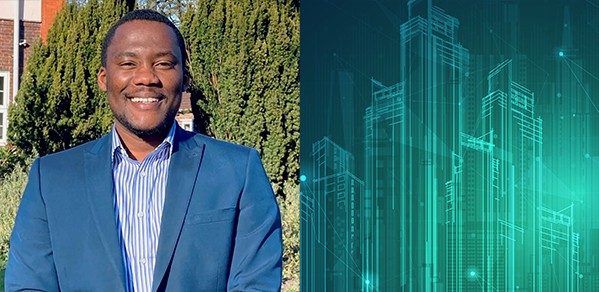
Dr Kwadwo Oti-Sarpong, Senior Research and Teaching Associate at the Cambridge Centre for Smart Infrastructure and Construction (CSIC), leads a multidisciplinary team announced as a winner of the 'AI-deas' challenge – a new University prize supporting ambitious ideas for how AI can address critical societal issues.
Understanding how to practically root AI use in ethical considerations, and showing how that can be done, will significantly change how we create the future we want.
Dr Kwadwo Oti-Sarpong
The winning project titled Decision-making with AI in connected places and cities will develop resources for local authorities to make ethical and informed decisions about the use of AI in their digitalisation initiatives. The project is one of five winners selected by ai@cam: the University’s new flagship mission to drive AI innovation that benefits science, citizens and society.
The team comprises Dr Jennifer Schooling, Dr Viviana Bastidas and Dr Manuel Herrera (Department of Engineering); Dr Li Wan and Jerry Chen (Department of Land Economy); Dr Ramit Debnath (Department of Architecture and Cambridge Zero); and Dr Maya Ganesh (Leverhulme Centre for the Future of Intelligence and the Institute of Continuing Education).
Public sector use of AI is growing, with some local authorities in England already using large language models and predictive analytics to make city-scale decisions.
“It is important that the use of AI to make decisions is ethical and leads to the desired outcomes,” said Dr Oti-Sarpong.
The project aims to investigate how local authorities in England are using AI to make decisions about issues such as placemaking (a collaborative process for shaping public space), land use and mobility, and sustainable water supply systems to create public value. Seed funding will be provided to get the project off the ground and support to scale its impact.
The Department of Engineering will lead this project and will collaborate with local authorities and experts in other domains including urban governance, philosophy and ethics.
“We are excited to be one of the winners of AI-deas and looking forward to working on this project with practitioners across disciplines to shape the future of public sector decision-making using AI in creating connected places,” said Dr Oti-Sarpong. “Understanding how to practically root AI use in ethical considerations, and showing how that can be done, will significantly change how we create the future we want.”
AI-deas is ai@cam’s first major initiative and will form part of a wider programme designed to deliver on the University’s AI mission. Through research funding, partnerships within and outside of the university, and education, ai@cam will more powerfully connect what happens in the university lab to the outside world.
Professor Anne Ferguson-Smith, Pro-Vice-Chancellor for Research and Steering Group member of ai@cam, said: “These are exactly the kinds of ambitious projects that are vital to delivering AI that serves society, but too often are neglected in the traditional funding landscape, because they require intensive collaboration across disciplines. I am thrilled we have a mechanism for enabling them. Cambridge is already home to some of the most groundbreaking AI research, and AI-deas encourages further creativity and innovative thinking in this area.”
Neil Lawrence, DeepMind Professor of Machine Learning and Chair of ai@cam, said: “The positive response we have had to the AI-deas initiative proves there is a vibrant community of researchers across all career levels who are passionate about connecting AI to public interest. AI has the potential to drive progress on the things that actually matter to people. The selected projects in this round of funding show how we can make that happen – for instance, bringing experts in machine learning, fertility and infant neurodevelopment together in a shared mission.”
Diane Coyle, Bennett Professor of Public Policy and Steering Group member of ai@cam, said: “AI innovation is often perceived as being driven by business. While a wealth of exciting work is coming from leading AI companies, they are not going to solve society’s biggest challenges themselves. Interdisciplinary AI research is vital to bridge from technological advances to public value. AI-deas aims to build some of those bridges.”
Adapted from a University of Cambridge story.

